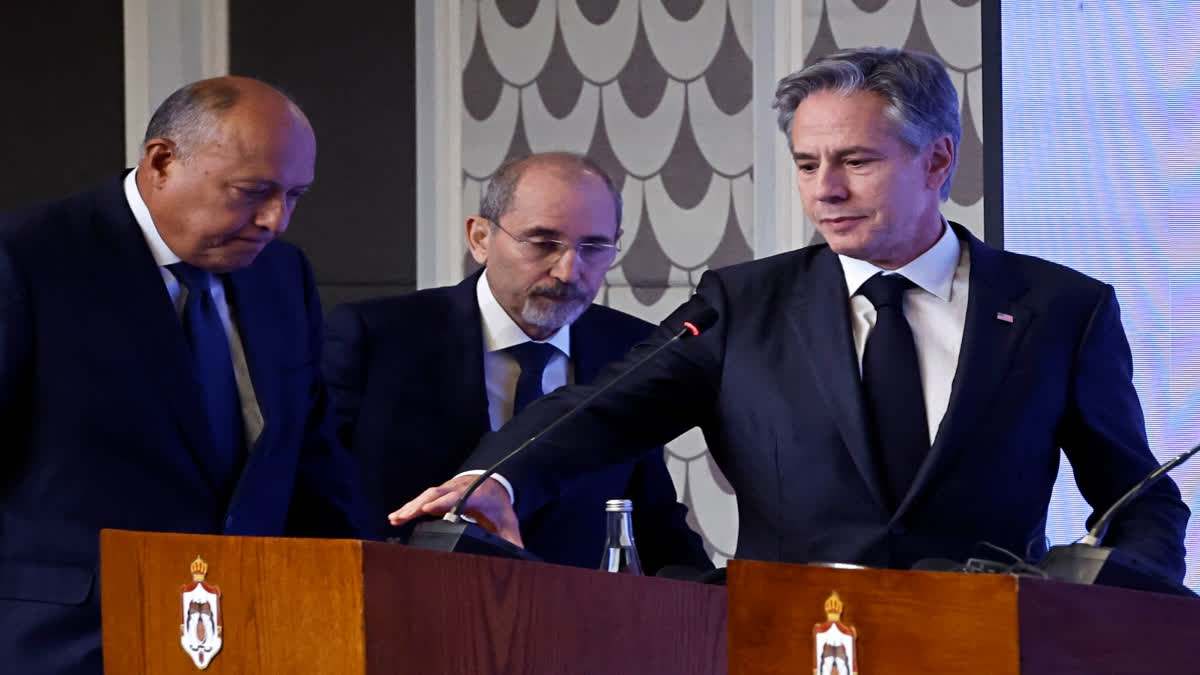Amman(Jordan): Arab leaders decrying the deaths of thousands of Palestinian civilians in the Israel-Hamas war pushed for an immediate cease-fire Saturday even as US Secretary of State Antony Blinken warned that such a move would be counterproductive and could encourage more violence by the militant group.
After an afternoon of talks with Egyptian, Jordanian, Saudi, Qatari and Emirati diplomats and a senior Palestinian official, Blinken stood side by side at a line of podiums with his counterparts from Jordan and Egypt to discuss what he said was their shared desire to protect civilians in Gaza and improve aid flows to the besieged territory.
The dissonance in the messages was evident. Nonetheless, the joint news conference between ministers from the Arab world and the top diplomat from Israel's closest ally and numerous photo opportunities contrasted with Blinken's time in Tel Aviv on Friday, when Blinken met alone with reporters after closed-door talks with Prime Minister Benjamin Netanyahu.
The Arab ministers repeatedly called for the fighting to stop now and condemned Israel's war tactics. "We cannot accept the justification as considered as the right of self-defense, collective punishment" of Palestinians in Gaza, Egypt's Sameh Shoukry said. "This cannot be a legitimate self-defence at all."
Blinken held firm to the US position that a cease-fire would harm Israel's right and obligation to defend its citizens after the surprise attack by Hamas on Oct 7 across southern Israel. He said the Biden administration's commitment to Israel's right to self-defence remains unwavering. "It is our view now that a cease-fire would simply leave Hamas in place, able to regroup and repeat what it did," Blinken said.
He said the US supports "humanitarian pauses" in Israel's operations to allow for improved aid flows an appeal Netanyahu pointedly rejected the day before and increased transit of foreign nationals out of Gaza and into Egypt. Blinken's colleagues from Jordan and Egypt did not think that went far enough.
President Joe Biden in a brief exchange with reporters as he left St Edmond Roman Catholic Church in Rehoboth Beach, Delaware, on Saturday suggested there has been some forward movement in the U.S efforts to persuade Israel to agree to a humanitarian pause. Asked if there was progress, he responded, "Yes."
In another direct contrast, Arab officials said it was far too soon to discuss one of Blinken's main agenda items, Gaza's postwar future. Stopping the killing and restoring steady humanitarian aid are immediate that must be addressed first, they said. "What happens next? How can we even entertain what will happen next?" said Jordan's Ayman al-Safadi. "We don't have all the variables to even start thinking about that." He added, We need to get our priorities straight."
But as they appeared before news cameras and reporters, the three men lent at least an appearance of solidarity. Blinken acknowledged Arab concerns about civilian casualties in Gaza and underscored the risk that the war poses to Israel's standing in neighbouring countries with whom it has had diplomatic relations for decades.
Shoukry and al-Safadi said they agreed to keep working with Blinken and others toward the ultimate goal of ending the war, restoring some sense of normalcy to Gaza and giving the Palestinian people reason to hope for an eventual independent state of their own. From Beirut, senior Hamas official Osama Hamdan told reporters that Blinken "should stop the aggression and should not come up with ideas that cannot be implemented." Hamdan said the future of Gaza will be decided by the Palestinians and that Arab foreign ministers should tell the American diplomat that "he cannot build an Arab coalition that is against the Palestinian people."
Blinken's first meeting in Jordan was with Lebanon's caretaker prime minister, Najib Mikati, whose economically and politically ravaged country is home to Hezbollah, an Iranian-backed force that is hostile to Israel. The United States has grave concerns that Hezbollah, which has stepped up rocket and cross-border attacks on northern Israel, will take a more active role in the Israel-Hamas war.
Hezbollah's chief, Hassan Nasrallah, on Friday gave his first major speech since the Hamas attacks, but did not forecast his group's greater involvement even as he professed that Hezbollah was unperturbed by US attempts to deter it. Blinken thanked Mikati for his leadership in preventing Lebanon from being pulled into a war that the Lebanese people do not want, the US State Department said.
Blinken then met with the foreign minister of Qatar, whose country has emerged as the most influential interlocutor with Hamas. Qatar has been key to negotiating the limited release of hostages held by Hamas as well as persuading Hamas to allow foreign citizens to leave Gaza and cross into Egypt.
Blinken also held talks with the head of the UN agency in charge of assisting Palestinian refugees, thanking Phillipe Lazzarini for his group's extraordinary work every single day as a lifeline to Palestinians in Gaza and a great, a great cost. The agency has seen about 70 staffers killed in the war so far and is running critically low on necessary supplies such as food, medicine and fuel. (AP)



